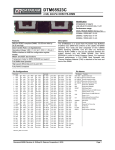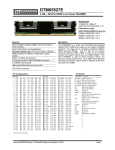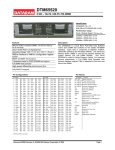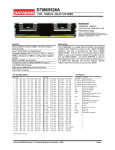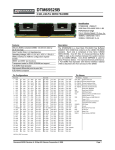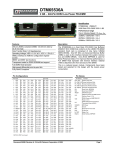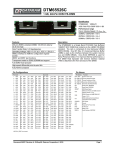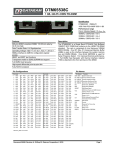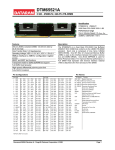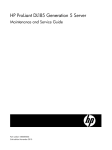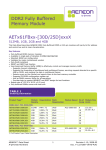Download Dataram DTM65517 memory module
Transcript
DTM65517 8 GB - 1Gx72, 240-Pin FB-DIMM Identification DTM65517 1Gx72 8GB 4Rx4 PC2-5300F-555-11-AA0 Performance range Clock / Module Speed / CL-tRCD -tRP 333MHz / DDR2-667 / 5-5-5 Features Description 240-pin JEDEC-compliant DIMM, 133.35 mm wide by 30.35 mm high Data Transfer Rate: 5.3 Gigabytes/sec Operating Voltage: VDD = 1.8 V ±0.1; VCC = 1.5V ±0.1 The DTM65517 is a Quad Rank PC2-5300 Fully Buffered 1Gx72 ECC DIMM that conforms to the JEDEC FB-DIMM standard. Twin sets of two ranks each are comprised of eighteen 512Mx4 DDR2 SDRAMs, using Dual-Die Packaging, each die being 256Mx4. One IDT (Rev L4) Advanced Memory Buffer (AMB) is used as the interface between the system memory bus and DIMM DRAMs. One 2K-bit EEPROM is used for Serial Presence Detect. For improved thermal performance, a Full DIMM Heat Spreader with thermal interface material (TIM) is attached to the front and back of the DIMM. SMBus interface to AMB for configuration register access MBIST and IBIST test functions Transparent mode for DDR2 SDRAM test support Full DIMM Heat Spreader High-speed differential point-to-point link Fully RoHS Compliant Pin Configurations Pin Names Front side Back side 1 VDD 31 PN3 61 /PN9 2 VDD 3 VDD 4 VSS 34 5 VDD 6 VDD 7 VDD 37 PN5 8 VSS 38 /PN5 9 VCC 10 VCC 39 40 VSS PN13 91 32 /PN3 62 VSS 33 VSS 63 PN10 PN4 64 /PN10 94 35 /PN4 65 VSS 36 VSS 66 PN11 67 /PN11 97 68 VSS 98 69 70 Pin Names 211 /SS9 SCK, /SCK Function /PS9 121 VDD 151 SN3 181 /SN9 System Clock Input 92 VSS 122 VDD 152 /SN3 182 VSS 212 VSS PN, /PN[13:0] Primary Northbound Data 93 PS5 123 VDD 153 VSS 183 SN10 213 SS5 PS, /PS[9:0] /PS5 124 VSS 154 SN4 184 /SN10 214 /SS5 SN. /SN[13:0] Secondary Northbound Data 95 VSS 125 VDD 155 /SN4 185 VSS 215 VSS SS. /SS[9:0] Secondary Southbound Data 96 PS6 126 VDD 156 VSS 186 /SN11 216 SS6 SCL Serial Clock, EEPROM /PS6 127 VDD 157 SN5 187 /SN11 217 /SS6 SDA Serial Data, EEPROM VSS 128 VSS 158 /SN5 188 VSS 218 VSS /RESET AMB Reset Signal VSS PS0 99 PS7 100 /PS7 129 VCC 130 VCC 159 VSS 160 SN13 189 VSS 190 SS0 219 SS7 220 /SS7 VCC AMB Core Power and AMB Channel Interface Power (1.5 V) VDD Primary Southbound Data 11 VSS 41 /PN13 71 /PS0 101 VSS 131 VSS 161 /SN13 191 /SS0 221 VSS 12 VCC 42 VSS 72 VSS 102 PS8 132 VCC 162 VSS 192 VSS 222 SS8 13 VCC 14 VSS 15 VTT 43 44 45 VSS RFU RFU 73 74 75 PS1 /PS1 VSS 103 /PS8 104 VSS 105 RFU2 133 VCC 134 VSS 135 VTT 163 VSS 164 RFU1 165 RFU1 193 SS1 194 /SS1 195 VSS 223 /SS8 224 VSS 225 RFU2 VDDSPD DRAM Address/Command/Clock Termination Power (VDD/2) SPD Power 16 VID1 46 VSS 76 PS2 106 RFU2 136 VID0 166 VSS 196 SS2 226 RFU2 VSS Ground 17 /RESET 47 VSS 77 /PS2 107 VSS 137 M_TEST 167 VSS 197 /SS2 227 VSS RFU Reserved For Future Use 18 VSS PN12 78 VSS 108 VDD 138 VSS 168 SN12 198 VSS 228 SCK DNU Do Not Use M_TEST SA[2:0] Margin Test Serial Address, EEPROM 48 19 RFU2 49 /PN12 79 PS3 109 VDD 139 RFU2 169 /SN12 199 SS3 229 /SCK 20 RFU2 50 VSS 80 /PS3 110 VSS 140 RFU2 170 VSS 200 /SS3 230 VSS 21 VSS 51 PN6 81 VSS 111 VDD 141 VSS 171 SN6 201 VSS 231 VDD 22 PN0 52 /PN6 82 PS4 112 VDD 142 SN0 172 /SN6 202 SS4 232 VDD 23 /PN0 53 VSS 83 /PS4 113 VDD 143 /SN0 173 VSS 203 /SS4 233 VDD 24 VSS 54 PN7 84 VSS 114 VSS 144 VSS 174 SN7 204 VSS 234 VSS 25 PN1 55 /PN7 85 VSS 115 VDD 145 SN1 175 /SN7 205 VSS 235 VDD 26 /PN1 56 VSS 86 RFU1 116 VDD 146 /SN1 176 VSS 206 RFU1 236 VDD 27 VSS 57 PN8 87 RFU1 117 VTT 147 VSS 177 SN8 207 RFU1 237 VTT 28 PN2 58 /PN8 88 VSS 118 SA2 148 SN2 178 /SN8 208 VSS 238 VDDSPD 29 /PN2 59 VSS 89 VSS 119 SDA 149 /SN2 179 VSS 209 VSS 239 SA0 30 VSS 60 PN9 90 PS9 120 SCL 150 VSS 180 SN9 210 SS9 240 SA1 DRAM Power and AMB DRAM I/O Power (1.8 V) VTT NOTE: M_TEST is not used Document 06051, Revision A, 24-Jul-08, Dataram Corporation © 2008 Page 1 DTM65517 8 GB - 1Gx72, 240-Pin FB-DIMM Front view 133.35 [5.250] 30.35 [1.191] 9.50 [0.374] 3.00 [0.118] 17.30 [0.681] 5.00 [0.197] 5.18 [0.204] 67.00 [2.638] 51.00 [2.008] 2.50 Min [0.098 Min] 123.00 [4.843] Back view Side view 7.49 Max [0.295] Max (w/heatspearder) 4.00 Min [0.157] Min 1.27 ±.10 [0.0500 ±0.0040] Notes Tolerances on all dimensions except where otherwise indicated are ±.13 [.005]. All dimensions are expressed: millimeters [inches] Document 06051, Revision A, 24-Jul-08, Dataram Corporation © 2008 Page 2 DTM65517 8 GB - 1Gx72, 240-Pin FB-DIMM Document 06051, Revision A, 24-Jul-08, Dataram Corporation © 2008 Page 3 DTM65517 8 GB - 1Gx72, 240-Pin FB-DIMM Document 06051, Revision A, 24-Jul-08, Dataram Corporation © 2008 Page 4 DTM65517 8 GB - 1Gx72, 240-Pin FB-DIMM Absolute Maximum Ratings Parameter Symbol Rating Unit Note Temperature, DDR2 DRAM Case TCase 0 to +95 C 1, 2 Temperature, Storage TSTG -55 to +100 C 1 VIN,VOUT -0.3 to 1.75 V 1 Voltage on VCC relative to VSS VCC -0.3 to 1.75 V 1 Voltage on VDD relative to VSS VDD -0.5 to 2.3 V 1 Voltage on VTT relative to VSS VTT -0.5 to 2.3 V 1 Power Dissipation PD 21 W 1 Voltage on any pin relative to VSS Notes: 1. Operation at or above absolute maximum rating can adversely affect device reliability. 2. For 85 C < TCase ≤ 95 C, tREFI = 3.9 μs max. DC Operating Conditions (TA = 0 to 70 C, Voltage referenced to VSS = 0V) Parameter Symbol Minimum Typical Maximum Unit AMB Supply Voltage VCC 1.455 1.5 1.575 V DDR2 Supply Voltage VDD 1.7 1.8 1.9 V Termination Voltage VTT 0.48 x VDD 0.50 x VDD 0.52 x VDD V EEPROM Supply Voltage (SPD) VDDSPD 3.0 3.3 Input High Voltage (SPD) VIH(DC) Input Low Voltage (SPD) VIL(DC) 1.0 Input High Voltage (RESET/BFUNC) VIH(DC) 1.0 Input Low Voltage( RESET/BFUNC) VIL(DC) Note 3.6 V VDDSPD V 1 0.8 V 1 V 2 0.5 V 2 Leakage Curent (RESET/BFUNC) IL -90 90 μA 2 Leakage Curent (Link) IL -5 5 μA Notes: 1. Applies to SMB and SPD bus signals. 2. Applies to AMB CMOS signal /RESET. Document 06051, Revision A, 24-Jul-08, Dataram Corporation © 2008 Page 5 DTM65517 8 GB - 1Gx72, 240-Pin FB-DIMM Differential Transmitter Output Specification Symbol VTX-DIFFp-p_L(1) MIN MAX Units 900 1300 mV Differential peak-to-peak output voltage for regular voltage swing VTX-DIFFp-p =2 * | VTX-D+ - VTX-D- | VTX-DIFFp-p_R(1) 800 --- mV Differential peak-to-peak output voltage for small voltage swing VTX-DIFFp-p =2 * | VTX-D+ - VTX-D- | DC common code output voltage for large voltage swing Defined as: VTX-CM = DC(avg) of | VTX-D+ + VTX-D- |/2 DC common mode output voltage for small voltage swing Defined as: VTX-CM = DC(avg) of | VTX-D+ + VTX-D- |/2 De-emphasized differential output voltage ratio for -3.5 dB de-emphasis De-emphasized differential output voltage ratio for -6 dB deemphasis AC peak-to-peak common mode output voltage for large swing VTX-CM-AC = Max | VTX-D+ + VTX-D- |/2 - Min | VTXD+ + VTX-D- |/2 AC peak-to-peak common mode output voltage for regular swing VTX-CM-AC = Max | VTX-D+ + VTX-D- |/2 - Min | VTXD+ + VTX-D- |/2 AC peak-to-peak common mode output voltage for small swing VTX-CM-AC = Max | VTX-D+ + VTX-D- |/2 - Min | VTXD+ + VTX-D- |/2 Maximum single-ended voltage in EI condition, DC + AC VTX-DIFFp-p_S(1) 520 --- mV VTX-CM_L(1) --- 375 mV VTX-CM_S(1) 135 280 mV VTX-DE-3.5Ratio(1,2,3) VTX-DE-6-Ratio(1,2,3) -3 -4 dB -5 -7 dB VTX-CM-ACp-p L(1,4) --- 90 mV VTX-CM-ACp-p R(1,4) --- 80 mV VTX-CM-ACp-p S(1,4) --- 70 mV VTX-IDLE-SE(5,6) --- 50 mV VTX-IDLE-SEDC(5,6,7) VTX-IDLE-DIFFp-p(6) --- 20 mV --- 40 mV VTX-SE(1,7) -75 750 mV Minimum TX eye width, 3.2 and 4 Gb/s TTX-Eye-MIN(1,9,10) 0.7 --- UI Maximum TX deterministic jitter, 3.2 and 4 Gb/s TTX-DJ-DD(1,9,10,11) --- 0.2 UI Parameter Differential peak-to-peak output voltage for large voltage swing VTX-DIFFp-p =2 * | VTX-D+ - VTX-D- | Maximum single-ended voltage in EI condition, DC only Maximum peak-to-peak differential voltage in EI condition Single-ended voltage(w.r.t. VSS) on D+/D- Instantaneous pulse width Differential TX output rise/fall time Given by 20%-80% voltage levels Mismatch between rise and fall times Differential return loss Measured over 0.1 GHz to 2.4GHz Common mode return loss Measured over 0.1 GHz to 2.4GHz Transmitter termination resistance TTX-PULSE(12) 0.85 --- UI TTX-RISE, TTXFALL(1) TTX-RF-MISMATCH 30 90 ps --- 20 ps RLTX-DIFF 8 --- dB RLTX-CM 6 --- dB RTX(13) 41 55 Ω 4 % RTX-Match-DC D+/D- TX resistance difference RTX-Match-DC = 2*| RTX-D+ - RTX-D- |/( RTX-D+ + RTX-D- ) Bounds are applied separately to high and low output voltage states Lane-to-lane skew at TX LTX-SKEW 1(14,16) --- 100+3UI ps Lane-to-lane skew at TX LTX-SKEW 2(15,16) --- 100+2UI ps TTX-DRIFTRESYNC(17) TTX-DRIFTRESAMPLE(17) BER(18) --- 240 ps --- 120 ps --- 10 Maximum TX Drift (resync mode) Maximum TX Drift (resample mode only) Bit Error Ratio Document 06051, Revision A, 24-Jul-08, Dataram Corporation © 2008 -12 Page 6 DTM65517 8 GB - 1Gx72, 240-Pin FB-DIMM NOTES FOR TRANSMITTER OUTPUT SPECIFICATIONS: 1. Specified at the package pins into a timing and voltage compliance test load. Common-mode measurements are performed using a 101010 pattern. 2. This is the ratio of the VTX-DIFFp-p of the second and following bits after a transition divided by the VTX-DIFFp-p of the first bit after a transition. 3. De-emphasis is disabled in the calibration state. 4. Includes all sources of AC common mode noise 5. Single-ended voltages below that value that are simultaneously detected on D+ and D- are interpreted as the Electrical Idle condition. 6. Specified at the package pins into a voltage compliance test load. Transmitters meet both single-ended and differential output E1 specifications. 7. This specification, considered with VRX-IDLE-SE-DC, implies a maximum 15mV single-ended DC offset between Tx and Rx pins during the electrical idle condition. This in turn allows a ground offset between adjacent FB-DIMM agents of 26mV when worst-case termination resistance matching is considered. 8. The maximum value is specified to be at least (VTX-DIFFp-p L / 4) + VTX-CM L + (VTX-CM-ACp-p / 2) 9. This number does not include the effects of SSC or reference clock jitter. 10. These timing specifications apply to resync mode only. 11. Defined as the dual-dirac deterministic jitter as described in Section 4 of the JEDEC FB-DIMM High Speed Differential PTP Link Draft Spec rev 0.8. 12. Pulse width measured at 0V differential. 13. The termination small signal resistance; tolerance across voltages from 100mV to 400mV shall not exceed ±5: with regard to the average of the values measured at 100mV and at 400mV for that pin. 14. Lane to Lane skew at the Transmitter pins for an end component. 15. Lane to Lane skew at the Transmitter pins for an intermediate component (assuming zero Lane to Lane skew at the Receiver pins of the incoming PORT). 16. This is a static skew. A FB-DIMM component is not allowed to change its lane to lane phase relationship after initialization. 17. Measured from the reference clock edge to the center of the output eye. This specification is met across specified voltage and temperature ranges for a single component. Drift rate of change is significantly below the tracking capability of the receiver. 18. BER per differential lane. Document 06051, Revision A, 24-Jul-08, Dataram Corporation © 2008 Page 7 DTM65517 8 GB - 1Gx72, 240-Pin FB-DIMM Differential Receiver Input Specification Symbol VRX-DIFFp-p_L(1) MIN MAX Units 170 1300 mV VRX-IDLE-SE(2,3,4) --- 65 mV VRX-IDLE-SEDC(2,3,4,5) VRX-SE(4) --- 35 mV -300 900 mV Single-pulse peak differential input voltage Amplitude ratio between adjacent symbols 1100mV < VRX-DIFFp-p ≤1300mV Amplitude ratio between adjacent symbols VRX-DIFFp-p ≤1100mV Maximum RX inherent timing error, 3.2 and 4 Gb/s Maximum RX inherent deterministic timing error, 3.2 and 4 Gb/s Single-pulse width at zero-voltage crossing VRX-DIFF-PULSE(4,6) 85 --- mV VRX-DIFF-ADJRATIO-HI(4,7) VRX-DIFF-ADJRATIO(4,7) TRX-TJ-MAX(4,8,9) --- 3 --- 4 --- 0.4 UI TRX-DJ-DD(4,8,9,10) --- 0.3 UI TRX-PW-ZC(4,6) 0.55 --- UI Single-pulse width at minimum-level crossing Differential RX input rise/fall time, given by 20%-80% voltage levels Common mode of the input voltage Defined as: VRX-CM = DC(avg) of | VRX-D+ + VRX-D- |/2 AC peak-to-peak common mode of input voltage VRX-CMAC = Max | VRX-D+ + VRX-D- |/2 - Min | VRX-D+ + VRX-D- |/2 Ratio of VRX-CM-ACp-p to minimum VRX-DIFFp-p Differential return loss Measured over 0.1 GHz to 2.4GHz Common mode return loss Measured over 0.1 GHz to 2.4GHz RX termination resistance D+/D- RX resistance difference RRX-Match-DC = 2*| RRX-D+ - RRX-D- |/( RRX-D+ + RRX-D- ) Lane-to-lane PCB skew at RX Lane to Lane PCB skew at the Receiver that must be tolerated. Minimum RX Drift Tolerance TRX-PW-ML(4,6) 0.2 --- UI TRX-RISE,TRX-FALL 50 --- ps VRX-CM(1,11) 120 400 mV VRX-CM-ACp-p(1) --- 270 mV VRX-CM-EH-Ratio(12) --- 45 % RLRX-DIFF 9 --- dB RLRX-CM 6 --- dB Parameter Differential peak-to-peak input voltage VRX-DIFFp-p =2 * | VRX-D+ - VRX-D- | Maximum single-ended voltage for EI condition, DC + AC Maximum single-ended voltage for EI condition, DC only Single-ended voltage (w.r.t. VSS) on D+/D- Minimum data tracking 3dB bandwidth Electrical idle entry detect time Electrical idle exit detect time Bit Error Ratio Document 06051, Revision A, 24-Jul-08, Dataram Corporation © 2008 RRX(13) 41 55 Ω RRX-Match-DC --- 4 % LRX-PCB-SKEW(14) --- 6 UI TRX-DRIFT(15) 400 --- ps FTRK(16) 0.2 --- MHz TEI-ENTRY DETECT(17) TEI-EXIT-DETECT --- 60 ns 30 ns BER(18) --- --- 10 -12 Page 8 DTM65517 8 GB - 1Gx72, 240-Pin FB-DIMM NOTES FOR RECEIVER INPUT SPECIFICATIONS: 1. Specified at the package pins into a timing and voltage compliant test setup. Note that signal levels at the pad are lower than at the pin. 2. Single-ended voltages below that value that are simultaneously detected on D+ and D- are interpreted as the Electrical Idle condition. Worst-case margins are determined by comparing EI levels with common mode levels during normal operation for the case with transmitter using small voltage swing (see RX Single-ended Electrical Idle Levels and RX Common Mode Levels). 3. Multiple lanes need to detect the EI condition before the device can act upon the EI detection. 4. Specified at the package pins into a timing and voltage compliance test setup. 5. This specification, considered with VTX-IDLE-SE-DC, implies a maximum 15mV single-ended DC offset between TX and RX pins during the elecrical idle condition. This in turn allows a ground offset between adjacent FB-DIMM of 26mV when worstcase termination resistance matching is considered. 6. The single-pulse mask provides sufficient symbol energy for reliable RX reception. Each symbol complies with both the singlepulse mask and the cumulative eye mask (see RX Single-Pulse Min Width and Amplitude Mask, Pulse Shifted Early, and RX Single-Pulse Min Width and Amplitude Mask, Pulse Shifted Late). 7. The relative amplitude ratio limit between adjacent symbols prevents excessive inter-symbol interference in the Rx. Each symbol must comply with the peak amplitude ratio with regard to both the preceding and subsequent symbols (see RX Maximum Adjacent Symbol Amplitude). 8. This number does not include the effects of SSC or reference clock jitter. 9. This number includes setup and hold of the RX sampling flop. 10. Defined as the dual-dirac deterministic timing error as described in Section 4.2.2 of the JEDEC FB-DIMM High-Speed Differential PTP Link Draft Spec, rev 0.8. 11. Allows for 15mV DC offset between transmit and receive devices. 12. The received differential signal satisfies both this ratio as well as the absolute maximum AC peak-to-peak common mode specification. For example, if VRX-DIFFp-p is 200mV, the maximum AC peak-to-peak common mode is the lesser of (200 mV * 0.45 = 90mV) and VRX-CM-ACp-p. 13. The termination small signal resistance; tolerance across voltages from 100mV to 400mV shall not exceed ±5Ω with regard to the average of the values measured at 100mV and at 400mV for that pin. 14. This number represents the lane-to-lane skew between TX and RX pins and does not include the transmitter output skew from the component driving the signal to the receiver. This is one component of the end-to-end channel skew in the AMB specification. 15. Measured from the reference clock edge to the center of the input eye. This specification is met across specified voltage and temperature ranges. Drift rate of change is significantly below the tracking capability of the receiver. 16. This bandwidth number assumes the specified minimum data transition density. Maximum jitter at 0.2MHz is 0.05UI. 17. The specified time includes the time required to forward the EI entry condition. 18. BER per differential lane. Document 06051, Revision A, 24-Jul-08, Dataram Corporation © 2008 Page 9 DTM65517 8 GB - 1Gx72, 240-Pin FB-DIMM Advanced Memory Buffer FBD Timing/Electrical Parameter EI Assertion Pass-Through Timing Symbol tEI PROPAGATE tEID EI Deassertion Pass-Through Timing tEI EI Assertion Duration Bit Lock Interval Frame Lock Interval MIN MAX Units 4 CLKs tBitlock 100 CLKs CLKs tBITLOCK 119 Frames tFRAMELOCK 154 Frames Advanced Memory Buffer Latency Parameters Parameter CMD to Data Latency (Data Rate = 533) Resample Delay Resync Delay Symbol MIN MAX Units tC2D_AMB tRESAMPLE_AMB_NB, RESAMPLE_AMB_SB tRESYNC_AMB_NB, tRESYNC_AMB_SB 20.3 25.1 ns 0.9 2.2 ns 2.3 3.9 ns Notes: 1. tC2D_AMB is the measured delay at AMB balls between the center of the first UI command frame on primary southbound lane 8 (AMB balls U29 and U28), and the center of the first UI of return on primary northbound lane 0 (AMB balls U1 and U2) - CL (DRAM CAS latency) value * frame clock period - AL (DRAM additional latency) value * frame clock period. This definition assumes that SB lane 8 is the latest lane to arrive at the AMB balls. This will typically be the case since SB lane 8 is the longest SB lane on FBDIMMs. If, due to large lane-to-lane skew at the DIMM gold finger, another lane is the latest lane to arrive at the AMB balls, this other lane must be used instead for the tC2D_AMB measurement. 2. tRESAMPLE_AMB_NB is the measured delay at AMB balls between the center of the first UI of a frame on secondary northbound lane 0 (AMB balls V4 and V5), and the center of the first UI of the same frame on primary northbound lane 0 (AMB balls U1 and U2). 3. tRESAMPLE_AMB_SB is the measured delay at AMB balls between the center of the first UI of a frame on primary southbound lane 8 (AMB balls U29 and U28), and the center of the first UI of the same frame on secondary southbound lane 8 (AMB balls Y26 and W26). 4. tRESYNC_AMB_NB is the measured delay at AMB balls between the center of the first UI of a frame on secondary northbound lane 0 (AMB balls V4 and V5), and the center of the first UI of the same frame on primary northbound lane 0 (AMB balls U1 and U2). 5. tRESYNC_AMB_SB is the measured delay at AMB balls between the center of the first UI of a frame on primary southbound lane 8 (AMB balls U29 and U28), and the center of the first UI of the same frame on secondary southbound lane 8 (AMB balls Y26 and W26). Document 06051, Revision A, 24-Jul-08, Dataram Corporation © 2008 Page 10 DTM65517 8 GB - 1Gx72, 240-Pin FB-DIMM AMB Power Specification (TA = 0 to 70 C, Voltage referenced to VSS = 0V) Parameter Power Value Unit Supply Symbol Test Condition Idle Current Single or last FBDIMM: L0 state, idle (0 BW); primary channel enabled, secondary channel disabled, CKE high; command and address lines stable, DDR2 SDRAM clock active. 1.5 V 2200 IDD_IDLE_0 1.8 V 900 Idle Current First FBDIMM: L0 state, idle (0 BW); primary and secondary channels enabled, CKE high; command and address lines stable, DDR2 SDRAM clock active. 1.5 V 3000 IDD_IDLE_1 1.8 V 900 1.5 V 2600 1.8 V 1600 1.5 V 3300 1.8 V 1400 1.5 V 3500 1.8 V 900 Active Power Active Power Training TDP BW, Single or Last DIMM; L0 State; TDP Channel BW=2.4GB/s@667, 67% READ, 33% WRITE; primary channel enabled; secondary channel disabled, CKE high; command and address lines stable, DDR2 SDRAM clock active. TDP BW, First DIMM; L0 State; TDP Channel IDD_TDP_1 BW=2.4GB/s@667, DIMM BW=1.6GB/s@667; 67% READ, 33% WRITE; primary channel enabled; secondary channel enabled, CKE high; command and address lines stable, DDR2 SDRAM clock active. Primary and secondary channels enabled; 100% toggle on all IDD_TRAINING channel lanes; DDR2 SDRAM devices idle (0 BW); CKE HIGH, command and address lines stable; DDR2 SDRAM clock active. IDD_TDP_0 Document 06051, Revision A, 24-Jul-08, Dataram Corporation © 2008 mA mA mA mA mA Page 11 DTM65517 8 GB - 1Gx72, 240-Pin FB-DIMM DRAM AC Characteristics (AC operating conditions unless otherwise noted) Parameter Symbol Min Max Value Value Unit Row Cycle Time tRC 60 - ns Auto Refresh Row Cycle Time tRFC 127.5 - ns Row Active Time tRAS 45 70K ns Row Address to Column Address Delay tRCD 15 - ns Row Active to row Active Delay tRRD 7.5 - ns Column Address to Column Address Delay tCCD 2 - CLK Row Precharge time tRP 15 - ns Note tWR 15 - ns tDAL (tWR/ tCK) + (tRP/ tCK) - ns System Clock Cycle Time tCK 3000 8000 ps Clock High Level Width tCH 0.45 0.55 CLK Clock Low Level Width tCL 0.45 0.55 CLK DQ output access time from CK & /CK tAC -0.500 +0.500 ns DQS-Out edge to Clock Edge skew tDQSCK -0.450 +0.450 ns DQS-Out edge to Data-out edge skew tDQSQ - 0.300 ns Data-Out hold time from DQS tQH tHP - tQHS - ns 1 Data hold skew factor tQHS - 0.400 ns 1 Clock Half Period tHP min (tCL , tCH) - ns 1 Input Setup Time (fast slew rate) tIS 0. 250 - ns 2,3,5,6 Input Hold Time (fast slew rate) tIH 0.375 - ns 2,3,5,6 6 Write Recovery Time Auto Precharge Write Recovery + Precharge Time tIPW 0.6 - CLK Write DQS High Level Width tDQSH 0.35 - CLK Write DQS Low Level Width tDQSL 0.35 - CLK CLK to First Rising edge to DQS-In Input Pulse Width tDQSS WL - 0.25 WL + 0.25 CLK Data-In Setup Time to DQS-In (DQ & DM) tDS 0.100 - ns 7 Data-In Hold Time to DQS-In (DQ & DM) tDH 0. 225 - ns 7 Notes: 1. 2. 3. 4. 5. 6. 7. This calculation accounts for tDQSQ(max), the pulse width distortion of on-chip and jitter. Data sampled at the rising edges of the clock: A0~A13, BA0~BA2, CKE, /S[1:0], /RAS, /CAS, /WE For command/address input slew rate > = 1.0 V/ns For command/address input slew rate > = 0.5 V/ns and <1.0 V/ns CK,/CK slew rates are > = 1.0V/ns These Parameters guarantee device timing, but they are not necessarily tested on each device, and they may be guaranteed by design or tester correlation. Data latched at both rising and falling edges of Data Strobes (DQS) Document 06051, Revision A, 24-Jul-08, Dataram Corporation © 2008 Page 12 DTM65517 8 GB - 1Gx72, 240-Pin FB-DIMM AC Operating Conditions (AC operating conditions unless otherwise noted) Parameter Symbol Min Max Value Value 0.35 - Unit CLK DQ Input Pulse Width tDIPW Read DQS Preamble Time tRPRE 0.9 1.1 CLK Read DQS Postamble Time tRPST 0.4 0.6 CLK Write DQS Preamble Hold Time tWPRE 0.35 - CLK Write DQS Postamble Time tWPST 0.4 0.6 CLK Mode Register Set Delay tMRD 2 - CLK Exit Self Refresh to Non-Read Command tXSNR tRFC + 10 - ns Exit Self Refresh to Read Command tXSRD 200 - CLK Average Periodic Refresh Interval tREFI Notes: 1. 2. Note - 7.8 μs 1 - 3.9 μs 2 For 0 C < TCase ≤ 85 C For 85 C < TCase ≤ 95 C Document 06051, Revision A, 24-Jul-08, Dataram Corporation © 2008 Page 13 DTM65517 8 GB - 1Gx72, 240-Pin FB-DIMM SERIAL PRESENCE DETECT MATRIX Byte# Function Value Hex 176 256 Bytes 0-116 Rev. 1.1 DDR2 FBDIMM 92 1.5V 1.8V 12 8 11 14 49 Bit 3 ~ Bit 0. Module Thickness (mm) Bit 4 ~ Bit 2. Module Height (mm) Bit 7, 6. Reserved 7<x<=8.0 30<x<=35 0 23 Bit 3 ~ Bit 0. Module Type Bit 7 ~ Bit 4. Reserved FB-DIMM Reserved 07 4-Bits 4 Ranks 0 20 00 0C 1 Number of SPD Bytes Written / SPD Device Size / CRC Coverage Bit 3 ~ Bit 0. SPD Bytes Used Bit 6 ~ Bit 4. SPD Bytes Total Bit 7. CRC Coverage SPD Revision 2 Key Byte / DRAM Device Type 0 11 09 Voltage Levels of this Assembly 3 Bit 3 ~ Bit 0. Power Supply 1 Bit 7 ~ Bit 4. Power Supply 2 SDRAM Addressing Bit 1, 0. Number of Banks Bit 5 ~ Bit 3.Column Address Bits Bit 7 ~ Bit 5. Row Address Bits - 4 Module Physical Attributes 5 Module Type 6 Module Organization Bit 3 ~ Bit 0. SDRAM Device Width Bit 5 ~ Bit 3. Number of Ranks Bit 7, 6. Reserved 7 8 Fine Timebase Dividend / Divisor Bit 3 ~ Bit 0. Fine Timebase (FTB) Dividend Bit 7 ~ Bit 4. Fine Timebase (FTB) Divisor - 9 Medium Timebase Dividend. 10 Medium Timebase Divisor. 11 SDRAM Minimum Cycle Time (tCKmin). 0 0 1 (MTB = 0.25ns) 4 (MTB = 0.25ns) 3.0 ns 12 13 14 15 16 17 01 04 SDRAM Maximum Cycle Time (tCKmax). 8.0 ns 20 SDRAM CAS Latencies Supported. Bit 3 ~ Bit 0. Minimum CL (clocks) Bit 7 ~ Bit 4. CL Range (clocks) SDRAM Minimum CAS Latency Time (tAAmin). 4 2 15 ns 24 SDRAM Write Recovery Times Supported Bit 3 ~ Bit 0. Minimum WR (clocks) Bit 7 ~ Bit 4. WR Range (clocks) SDRAM Write Recovery Time (tWR). 2 4 15.0 ns SDRAM Write Latencies Supported Bit 3 ~ Bit 0. Minimum WL (clocks) - 2 Document 06051, Revision A, 24-Jul-08, Dataram Corporation © 2008 3C 42 3C 42 Page 14 DTM65517 8 GB - 1Gx72, 240-Pin FB-DIMM 19 Bit 7 ~ Bit 4. WL Range (clocks) SDRAM Additive Latencies Supported. Bit 3 ~ Bit 0. Minimum AL (clocks)Bit 7 ~ Bit 4. AL Range (clocks) SDRAM Minimum RAS to CAS Delay (tRCD). 0 5 15 ns 3C 20 SDRAM Minimum Row Active to Row Active Delay (tRRD). 7.5 ns 1E 21 SDRAM Minimum Row Precharge Time (tRP). 15 ns 3C 18 4 50 SDRAM Upper Nibbles for tRAS and tRC. 22 00 23 Bit 3 ~ Bit 0. tRAS Most Significant Nibble Bit 7 ~ Bit 4. tRC Most Significant Nibble SDRAM Minimum Active to Precharge Time (tRAS). 24 SDRAM Minimum Active to Active/Refresh Time (tRC). 60.0 ns F0 25 SDRAM Minimum Refresh Recovery Time Delay (tRFC), (LSB). 127.5 ns FE 26 SDRAM Minimum Refresh Recovery Time Delay (tRFC), (MSB). 127.5 ns 01 27 SDRAM Minimum Internal Write to Read Command Delay (tWTR). 7.5ns SDRAM Minimum Internal Read to Precharge Command Delay 7.5ns (tRTP). SDRAM Burst Lengths Supported Bit 0. BL = 4 X Bit 1. BL = 8 X Bit 6 ~ Bit 2.TBD Bit 7. Burst Chop SDRAM Terminations Supported. Bit 0. 150 ohms ODT X Bit 1. 75 ohms ODT X Bit 2. 50 ohms ODT X Bit 6 ~ Bit 3.TBD SDRAM Drivers Supported. Bit 0. Weak Driver X Bit 7 ~ Bit 1. TBD SDRAM Average Refresh Interval (tREFI) / Double Refresh mode bit / High Temperature self-refresh rate support indication. Bit 0 ~ Bit 3. Average Refresh Interval (tREFI) uS 7.8 Bit 5, Bit 4. TBD 0 Bit 6. High Temperature Self-Refresh - 1-Required Bit 7. Double Refresh Requirement - 1-Supported Tcasemax Delta. Bit 3 ~ Bit 0. DT4R4W Delta, Subfield B: 0.4 °C 0 Bit 7 ~ Bit 4. Tcasemax, Subfield A: 2 °C 10 Thermal Resistance of SDRAM Package. °C/W 24.5 SDRAM Case Temperature Rise from Ambient due to Activate-Precharge minus 2.8 °C offset temperature (DT0). °C Bit 1, Bit 0. Reserved 0 Bit 7 ~ Bit 2. DT0 0.3 SDRAM Case Temperature Rise from Ambient due to Precharge/Quiet 1.5 Standby (DT2N/DT2Q). °C 28 29 30 31 32 33 34 35 36 Document 06051, Revision A, 24-Jul-08, Dataram Corporation © 2008 45.0 ns B4 1E 1E 03 07 01 C2 51 31 04 0F Page 15 DTM65517 8 GB - 1Gx72, 240-Pin FB-DIMM SDRAM Case Temperature Rise from Ambient due to Precharge 0.15 Power-Down (DT2P). °C SDRAM Case Temperature Rise from Ambient due to Active Standby 38 1.65 (DT3N). °C SDRAM Case Temperature Rise from Ambient due to Page Open Burst Read/DT4R4W Mode Bit (DT4R/DT4R4W Mode Bit). 39 Bit 0. DT4R4W Mode Bit, Subfield B: 0.4 °C 0 Bit 7 ~ Bit 1. DT4R, Subfield A: 0.4 °C 17.6 SDRAM Case Temperature Rise from Ambient due to Burst 40 9 Refresh (DT5B). °C SDRAM Case Temperature Rise from Ambient due to Bank Interleave 41 10.5 Reads with Auto-Precharge (DT7). °C 42-74 Reserved UNUSED 37 0A 0B 18 12 15 00 75 QR Control 29 76 QR ODT control for rank 0 and rank 1 reads and writes 44 77 QR ODT1 and ODT2 control for reads 66 78 ODT definition for rank 2 and 3 FBD ODT Definition AA Bit 1, Bit 0. Rank 0 ODT Bit 3, Bit 2. TBD Bit 5, Bit 4. Rank 1 ODT Bit 7, Bit 6. TBD 79 80 Reserved 150 Ohms TBD 150 Ohms 0 UNUSED 22 00 Channel Protocols Supported, Least Significant Byte 81 82 83 84 85 86 87 88 0-Not Supported Bit 1. DDR2 Base ECC Protocol - 1-Supported Bit 7 ~ Bit 2. TBD 0 Channel Protocols Supported, Most Significant Byte UNUSED 00 Back-to-back Turnaround Cycles 10 Bit 0, DDR2 Base Non-ECC Protocol - Bit 1, Bit 0. Rank Read-to-Read - 0 add-l clock Bit 3, Bit 2. Write-to-Read - 0 add-l clock Bit 5, Bit 4. Read-to-Write - 1 add-l clock Bit 7, Bit 6. TBD 0 AMB Read Access Time for DDR2-800 (AMB.LINKPARNXT[1:0] = 11) Bit 3 ~ Bit 0. Read Access Fine Granularity (UI) 10 Bit 7 ~ Bit 4. Read Access Coarse Granularity (tCK) 4 AMB Read Access Time for DDR2-667 (AMB.LINKPARNXT[1:0] = 10) Bit 3 ~ Bit 0. Read Access Fine Granularity (UI) 6 Bit 7 ~ Bit 4. Read Access Coarse Granularity (tCK) 4 AMB Read Access Time for DDR2-533 (AMB.LINKPARNXT[1:0] = 01) Bit 3 ~ Bit 0. Read Access Fine Granularity (UI) 8 Bit 7 ~ Bit 4. Read Access Coarse Granularity (tCK) 3 Thermal Resistance of AMB Package from Top (Case) to Ambient 21 ( Psi T-A AMB ). °C/W AMB Case Temperature Rise from Ambient due to AMB in Idle_0 State 58 (DT AMB Idle_0). °C Document 06051, Revision A, 24-Jul-08, Dataram Corporation © 2008 02 4A 46 38 2A 3A Page 16 DTM65517 8 GB - 1Gx72, 240-Pin FB-DIMM 89 90 91 92 93 94-97 98 99 100 101 102 103 104 105 106 107 108 109 110 111 112 113 114 115 116 117 118 119 120,121 122-125 126 127 128-131 132 133 134 135 136 AMB Case Temperature Rise from Ambient due to AMB in Idle_1 State (DT AMB Idle_1). °C AMB Case Temperature Rise from Ambient due to AMB in Idle_2 State (DT AMB Idle_2). °C AMB Case Temperature Rise from Ambient due to AMB in Active_1 State (DT AMB Active_1). °C AMB Case Temperature Rise from Ambient due to AMB in Active_2 State (DT AMB Active_2). °C AMB Case Temperature Rise from Ambient due to AMB in L0s State (DT AMB L0s). °C Reserved AMB Junction Temperature Maximum (Tjmax). °C Reserved Reserved AMB Personality Bytes: Pre-initialization. AMB Personality Bytes: Pre-initialization. AMB Personality Bytes: Pre-initialization. AMB Personality Bytes: Pre-initialization. AMB Personality Bytes: Pre-initialization. AMB Personality Bytes: Pre-initialization. AMB Personality Bytes: Post-initialization. AMB Personality Bytes: Post-initialization. AMB Personality Bytes: Post-initialization. AMB Personality Bytes: Post-initialization. AMB Personality Bytes: Post-initialization. AMB Personality Bytes: Post-initialization. AMB Personality Bytes: Post-initialization. AMB Personality Bytes: Post-initialization. AMB Manufacturer’s JEDEC ID Code. AMB Manufacturer’s JEDEC ID Code. Module ID: Module Manufacturer’s JEDEC ID Code. Module ID: Module Manufacturer’s JEDEC ID Code. Module ID: Module Manufacturing Location. Module ID: Module Manufacturing Date Module ID: Module Serial Number. Cyclical Redundancy Code (CRC). Cyclical Redundancy Code (CRC). Module Part Number Module Part Number Module Part Number Module Part Number Module Part Number Module Part Number Document 06051, Revision A, 24-Jul-08, Dataram Corporation © 2008 71 47 58 3A 95 5F 79 4F UNUSED 00 UNUSED 125 00 1F 0A 00 A5 02 DA 66 97 9C DB 36 04 AF E8 E8 E8 E8 7F B3 01 91 00 ## ## 24 94 20 44 41 54 41 52 UNUSED [date] [serial number] D A T A R Page 17 DTM65517 8 GB - 1Gx72, 240-Pin FB-DIMM 137 138 139 140 141 142 143 144 145 146,147 148,149 150 151 152-175 176-255 Module Part Number Module Part Number Module Part Number Module Part Number Module Part Number Module Part Number Module Part Number Module Part Number Module Part Number Module Revision Code SDRAM Manufacturer’s JEDEC ID Code Manufacturer’s Specific Data Manufacturer’s Specific Data Manufacturer’s Specific Data Open for customer use Document 06051, Revision A, 24-Jul-08, Dataram Corporation © 2008 A M 6 5 5 1 7 UNUSED UNUSED UNUSED UNUSED 41 4D 20 36 35 35 31 37 20 00 00 00 00 00 00 Page 18 DTM65517 8 GB - 1Gx72, 240-Pin FB-DIMM DATARAM CORPORATION, USA Corporate Headquarters, P.O.Box 7528, Princeton, NJ 08543-7528; Voice: 609-799-0071, Fax: 609-799-6734; www.dataram.com All rights reserved. The information contained in this document has been carefully checked and is believed to be reliable. However, Dataram assumes no responsibility for inaccuracies. The information contained in this document does not convey any license under the copyrights, patent rights or trademarks claimed and owned by Dataram. No part of this publication may be copied or reproduced in any form or by any means, or transferred to any third party without prior written consent of Dataram. Document 06051, Revision A, 24-Jul-08, Dataram Corporation © 2008 Page 19



















